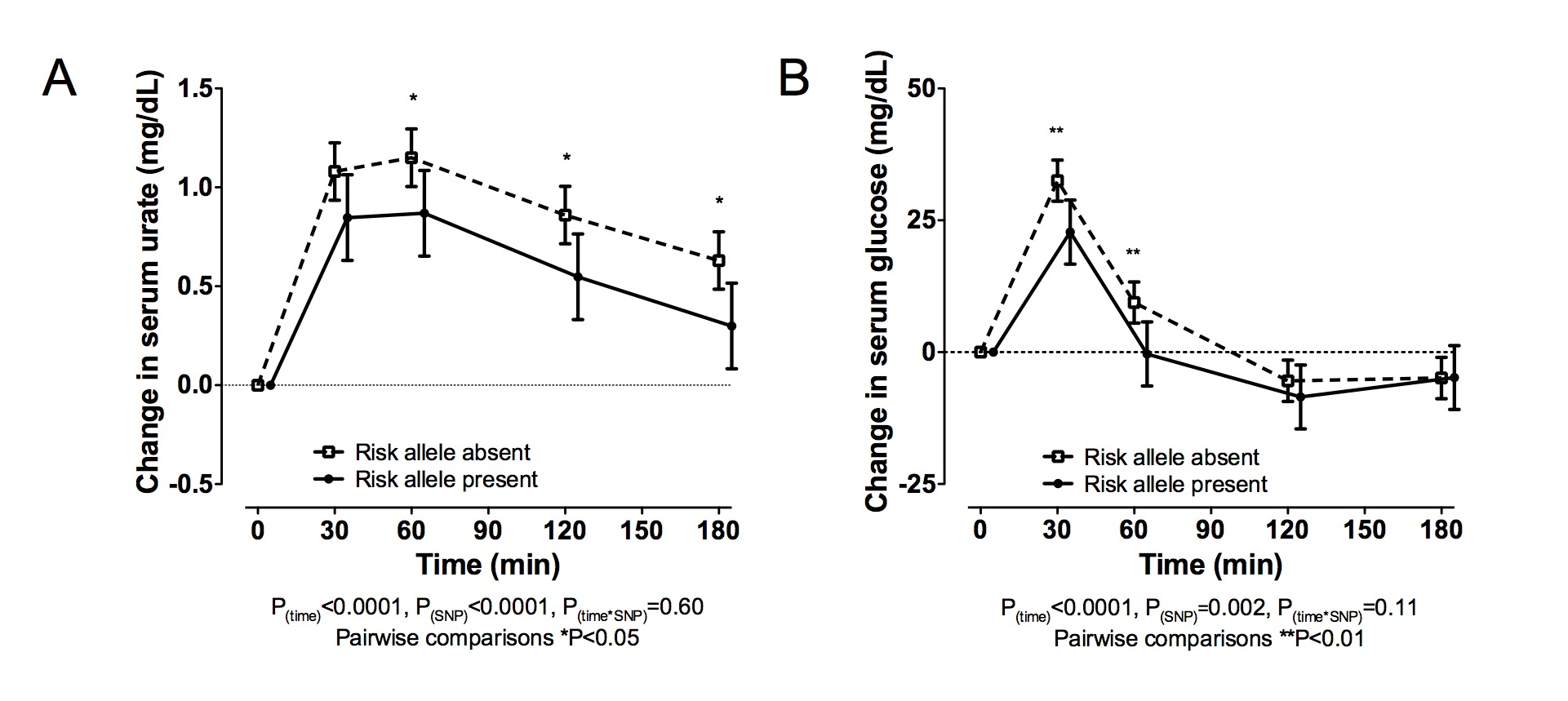Session Information
Session Type: Abstract Submissions (ACR)
Background/Purpose: Genetic variation in ABCG2 is a major risk factor for hyperuricemia and gout. This gene encodes a high-capacity urate transporter expressed in the intestine, liver and renal tubule. Intake of fructose-containing beverages is also associated with development of hyperuricaemia and gout. A recent report has shown that variation in the other major genetic risk factor for gout, SLC2A9, influences serum urate (SU) and fractional excretion of uric acid (FEUA) responses to a fructose load. The aim of this study was to test the hypothesis that the ABCG2 gout risk allele 141K also promotes the hyperuricemic response to fructose loading.
Methods: Healthy volunteers (n=74) provided serum and urine samples immediately before and 30, 60, 120 and 180 minutes after ingesting a 64g fructose solution. Data were analyzed based on the presence or absence of the ABCG2 141K gout risk allele using a mixed models approach to repeated measures.
Results: The 141K risk allele was present in 23 participants (31%). Overall, SU concentrations during the fructose load were similar in those with and without the 141K allele (PSNP=0.15). However, the presence of the 141K risk allele was associated with a smaller increase in SU following fructose intake (PSNP<0.0001) (Figure 1A). Those with the 141K allele also had a smaller increase in serum glucose following the fructose load (PSNP=0.002) (Figure 1B). Higher FEUA at baseline and throughout the fructose load was observed in those with the 141K risk allele (PSNP<0.0001). However, the change in FEUA in response to fructose was not different in those with and without the 141K risk allele (PSNP=0.39).
Conclusion: In contrast to the predicted responses for a hyperuricemia/gout risk allele, the ABCG2 141K allele is associated with smaller increases in SU following a fructose load. The FEUA data provide further evidence that the ABCG2 141K allele does not increase hyperuricemia/gout risk through direct effects on renal tubular uric acid transport. Rather, the results suggest that ABCG2 variants may act through extra-renal metabolic pathways, which, in turn, influence SU levels and gout risk.
Figure 1: A. Change in SU. B. Change in serum glucose. Data are presented as mean (95% CI). Dashed line represents 141K (risk) allele absent, solid line represents 141K (risk) allele present.
Disclosure:
N. Dalbeth,
None;
M. House,
None;
G. Gamble,
None;
B. Pool,
None;
A. Horne,
None;
L. Purvis,
None;
A. Stewart,
None;
M. E. Merriman,
None;
M. Cadzow,
None;
A. Phipps-Green,
None;
T. R. Merriman,
None.
« Back to 2013 ACR/ARHP Annual Meeting
ACR Meeting Abstracts - https://acrabstracts.org/abstract/abcg2-may-influence-risk-of-gout-through-extra-renal-metabolic-pathways-analysis-of-the-effects-of-the-q141k-variant-on-serum-urate-responses-to-a-fructose-load/

